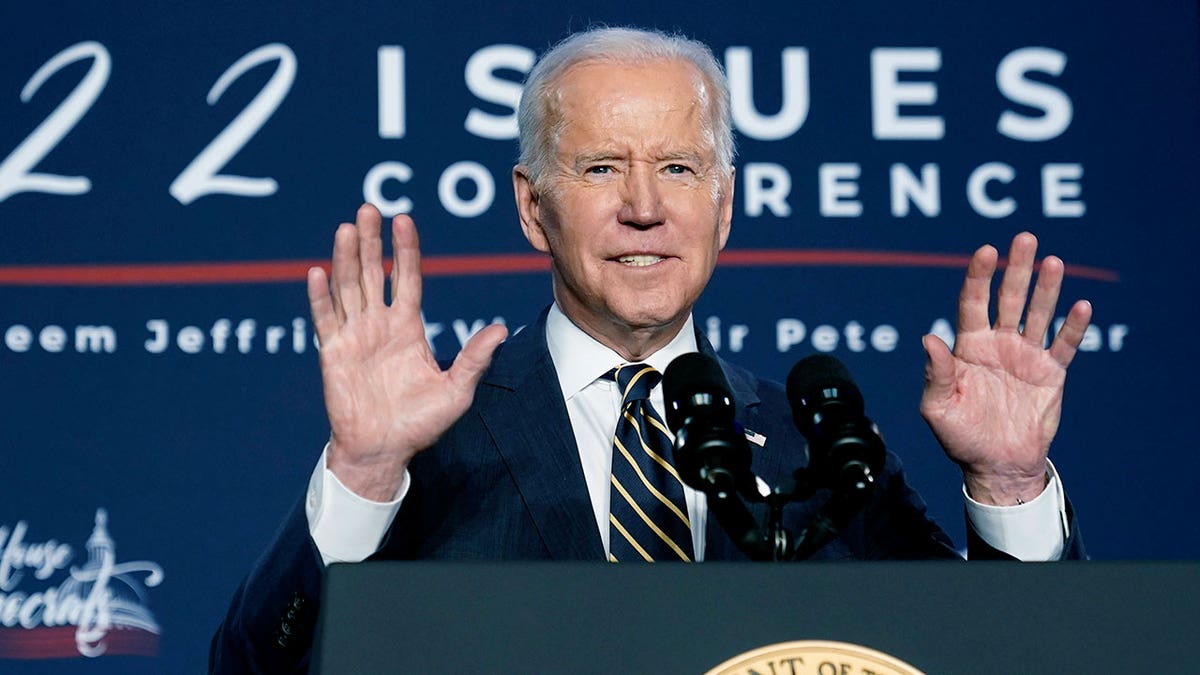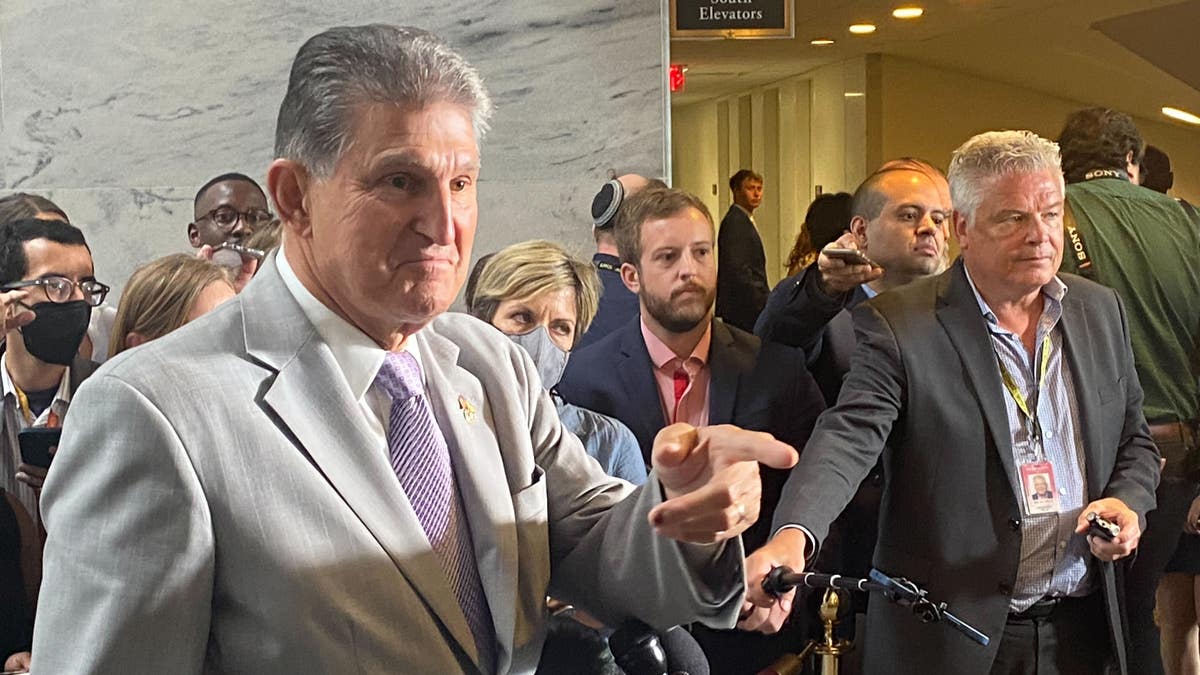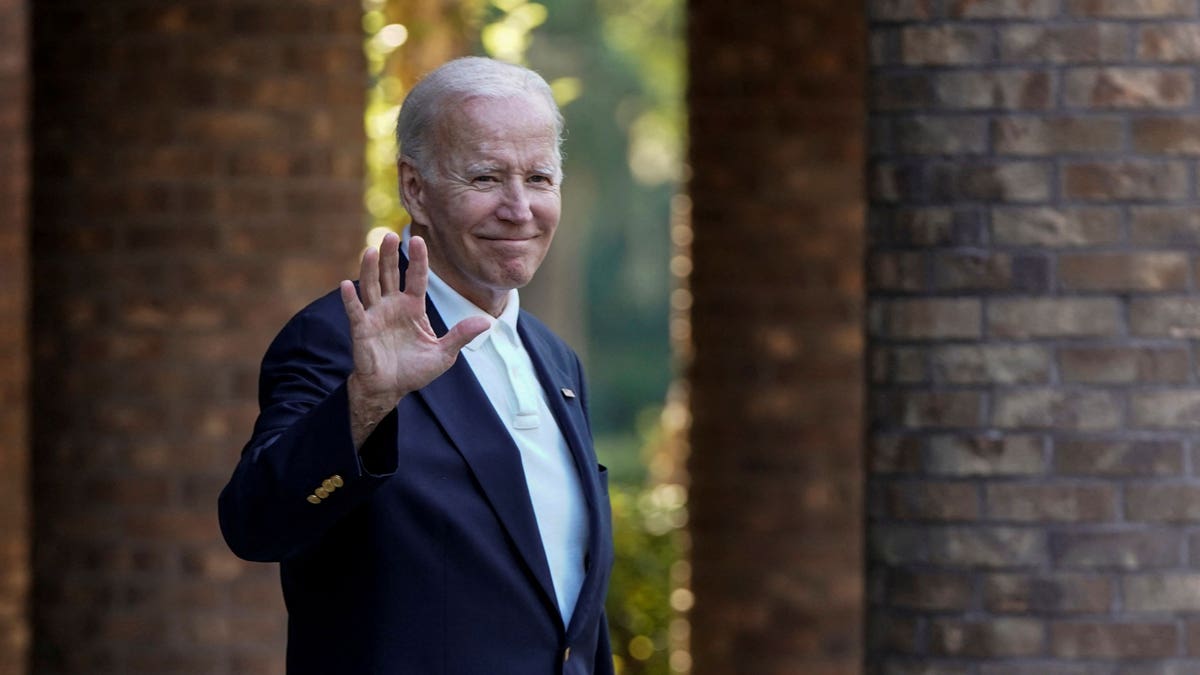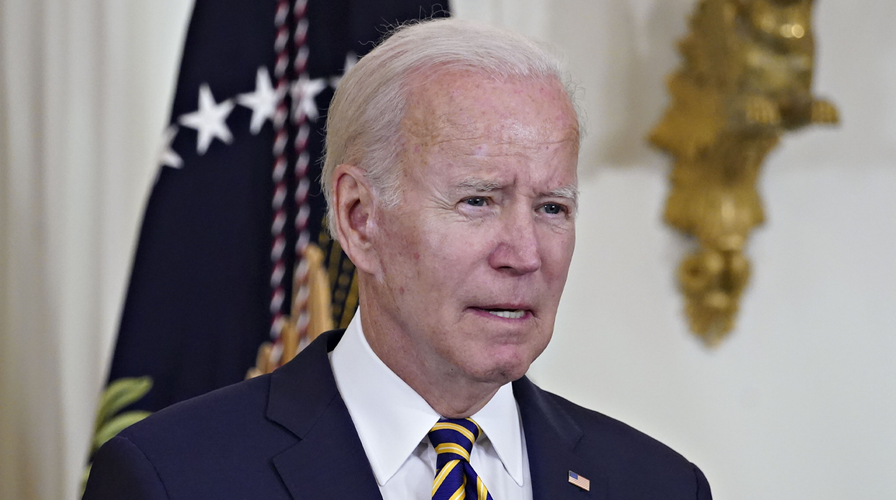President Biden signed the Inflation Reduction Act into law on Tuesday, saying "the American people won, and the special interests lost" with the new legislation and touting Democratic support while slamming Republicans for not backing the bill.
The president returned to the White House after a week-long vacation in Kiawah Island, South Carolina. Biden was joined by House Majority Whip Jim Clyburn and Senate Majority Leader Chuck Schumer during an event in the State Dining Room at the White House.
"With this law, the American people won, and the special interests lost," Biden said Tuesday. "This administration began amid a dark time in America … a once-in-a-century pandemic, devastating joblessness, clear and present threats to democracy and the rule of law, doubts about America's future itself — and yet we've not wavered, we've not flinched, and we've not given in."
Biden said, instead, the law will "deliver results for the American people."
ANALYSIS SUGGESTS INFLATION REDUCTION ACT WILL REDUCE ANNUAL INFLATION BY ONLY 0.1 PERCENTAGE POINTS

President Joe Biden speaks at the House Democratic Caucus Issues Conference. (AP Photo/Patrick Semansky)
"We didn't tear down. We built up. We didn't look back. We look forward," Biden said. "And today, today, offers further proof that the soul of America is vibrant. The future of America is bright, and the promise of America is real. And just beginning."
The bill, which was passed by the Senate earlier this month and the House of Representatives last week, costs an estimated $437 billion, with $369 billion going toward investments in "Energy Security and Climate Change," according to a summary by Senate Democrats.
Vice President Kamala Harris cast a tie-breaking vote to allow the legislation to pass, 51-50, in the Senate, and the House passed the legislation a few days later.
"I am confident this bill will endure as one of the greatest legislative feats in decades," said Schumer, D-N.Y. "In normal times, getting these bills done would be a huge achievement, but to do now, with only 50 Democratic votes in the Senate over an intransigent Republican minority, is nothing short of amazing."
Schumer thanked Biden for his leadership during the Tuesday event, and he thanked his Democratic colleagues, including Sen. Joe Manchin, D-W.Va., for joining together to pass the package, saying it shows "how dedicated and persistent our caucus is."
Clyburn touted Biden for being a "statesman willing to put people over politics" and called the House of Representatives’ passage of the legislation "one of the few truly historic days in the 30 years I spent in Congress."
"The bill I'm about to sign is not just about today, it's about tomorrow," Biden said. "It's about delivering progress and prosperity to American families."
He added: "It's about showing the American and the American people that democracy still works in America, notwithstanding all the talk of its demise, not just for the privileged few but for all of us."
Biden said that the "critical duty" of the president is "to defend what is best about America" and to "pursue justice, to ensure fairness, deliver results that create possible these possibilities that all of us, all of us can live a life of consequence and prosperity in a nation that's safe and secure."
"That's the job I'm fulfilling," Biden said, adding, "And today is part of an extraordinary story that has been written by this administration and our brave allies in the Congress."

Sen. Joe Manchin, D-W.Va., calls on a reporter during a press conference about Democrats' reconciliation bill. (Tyler Olson/Fox News)
Biden also stressed that the Inflation Reduction Act, consistent with his campaign promise, will not raise taxes on any American making less than $400,000.
Biden, in a swipe at Republicans, said, "Democrats sided with the American people and every single Republican in the Congress sided with the special interests in this, every single one."
"Remember, every single Republican in Congress voted against this bill — every single Republican in Congress voted against lowering prescription drug prices, against lowering health care costs, against the fairer tax system," Biden said. "Every single Republican, every single one, voted against tackling the climate crisis against lowering our energy cost, against creating good paying jobs."
He added: "My fellow Americans, that's the choice we face. We can protect the already powerful or show the courage to build a future where everybody has an even shot."
The legislation follows a year of negotiations and cuts from a previous bill, the Build Back Better Act, which initially called for more than $3 trillion in spending and failed in the Senate.
Once Democrats came to an agreement, Biden, earlier this month, urged Congress to "put politics aside" and pass the bill, while acknowledging that it was "far from perfect."
"President Biden and Congressional Democrats have worked together to deliver a historic legislative achievement that defeats special interests, delivers for American families, and grows the economy from the bottom up and middle out," the White House said in a fact sheet released Monday.
BIDEN RETURNING TO WHITE HOUSE TO SIGN INFLATION REDUCTION ACT AHEAD OF MULTI-STATE TOUR
Democrats project that the legislation will reduce the deficit by bringing in $737 billion. This includes an estimated $124 billion from IRS tax enforcement, the projected result of hiring 87,000 new IRS agents who will ramp up audits.
The bill also imposes a 15% corporate minimum tax that the Joint Committee on Taxation predicts will raise $222 billion, and prescription drug pricing reform that the Senate estimates will bring in $265 billion.

President Joe Biden departs from Holy Spirit Catholic Church after attending Mass on Johns Island, South Carolina, on Aug. 13, 2022. (Reuters/Joshua Roberts)
One thing the Inflation Reduction Act is not expected to do, according to multiple analyses, is reduce inflation. The Congressional Budget Office said the bill will have "a negligible effect" on inflation in 2022, and in 2023 its impact would range between reducing inflation by 0.1% and increasing it by 0.1%.
The United States is facing record-high levels of inflation, which slowed in July for the first time in months but kept prices near the highest level in 40 years.
The Labor Department said last week that the consumer price index, a broad measure of the price for everyday goods, including gasoline, groceries and rents, rose 8.5% in July from a year ago, below the 9.1% year-over-year surge recorded in June. Prices were unchanged in the one-month period from June.
Scorching-hot inflation has created severe financial pressures for most U.S. households, which are forced to pay more for everyday necessities like food and rent. The burden is disproportionately borne by low-income Americans, whose already stretched paychecks are heavily impacted by price fluctuations.
INFLATION CLIMBED 8.5% IN JULY AS PRICES COOL BUT REMAIN NEAR RECORD HIGH
Although American workers have seen strong wage gains in recent months, inflation has largely eroded those. Real average hourly earnings decreased 0.5% in July from the previous month when accounting for higher consumer prices, according to the Labor Department. On an annual basis, real earnings actually dropped 3% in July.
There was some real reprieve for U.S. households last month in the form of lower energy prices, which contributed to the decline in headline inflation. The cost of energy fell 4.6% in July from the previous month, though it remains 32.9% higher than just one year ago, while gasoline prices fell 7.7% in July. They remain up 44.9% from last year.
However, other price increases were extensive in July with inflation remaining stubbornly high. The food index climbed 1.1%, putting the 12-month increase at 10.9%, the highest since May 1979. Consumers paid more for items like cereal, chicken, milk and fresh vegetables.
CLICK HERE TO GET THE FOX NEWS APP
Shelter costs, which account for about 40% of the core inflation increase, have climbed 5.7%, the fastest since February 1991.
Rent costs jumped 0.7% over the month and 6.3% on an annual basis. Rising rents are a concerning development because higher housing costs most directly and acutely affect household budgets. Another data point that measures how much homeowners would pay in equivalent rent if they had not bought their home climbed 0.6% in July from the previous month.
Fox News' Ronn Blitzer and Megan Henney contributed to this report.













































